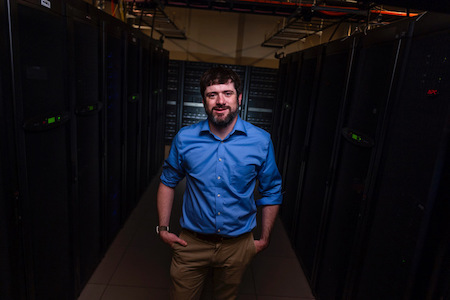Past Event | July 26

Trusted CI Webinar
A capability-based authorization infrastructure for distributed High Throughput Computing
The OSG Consortium provides researchers with the ability to bring their distributed high throughput computing (dHTC) workloads to a pool of resources consisting of hardware across approximately 100 different sites. Using this “Open Science Pool” resource, projects can leverage the opportunistic access (nodes that would be otherwise idle at the site), dedicated hardware, or allocated time at large-scallel NSF-funded resources.
While dHTC can be a powerful tool to advance scientific discovery, managing trust relationships with so many sites can be challenging; the OSG helps bootstrap the trust relationships between project and provider. Further, authorization in the OSG ecosystem is an evolving topic. On the national and international infrastructure, we are leading the transition from identity-based authorization –– basing decisions on “who you are” –– to capability based authorization. Capability-based authorization focuses on “what can you do?” and is implemented through tools like bearer tokens. Changing the mindset of an entire ecosystem is wide-ranging work, involving dedicated projects such as the new NSF-funded “SciAuth” and international partners like the Worldwide LHC Computing Grid.
In this talk, we’ll cover the journey of the OSG to a capability-based authorization as well as the challenges and opportunities of changing trust models for a functioning infrastructure.
About the speaker

Brian Bockelman is a Principal Investigator at the Morgridge Institute for Research and co-PI on the Partnership to Advance Throughput Computing (PATh) and Institute for Research and Innovation in Software for High Energy Physics (IRIS-HEP). Within the OSG, he leads the Technology Area, which provides the software and technologies that underpin the OSG fabric of services. He is also a co-PI on the new SciAuth project, led by Jim Basney, which aims to coordinate the deployment of capability-based authorization across the science and engineering cyberinfrastructure.
Before joining Morgridge, Bockelman received a joint PhD in Mathematics and Computer Science from the University of Nebraska-Lincoln (UNL) and was an integral member of the Holland Computing Center at UNL. His team helps advance Research Computing activities at Morgridge and are partners within the Center for High Throughput Computing (CHTC) at University of Wisconsin-Madison.
About Trusted CI
This talk is organized by Trusted CI, an NSF Cybersecurity Center of Excellence with the mission of improving the cybersecurity of NSF computational science and engineering projects and allowing those projects to focus on their science endeavors. The webinar series aims to provide readily available cybersecurity services tailored to the NSF science community. A recording of the webinar will be available here for later viewing.
When
Monday, July 26th at 11:00am ET
Where
Virtual webinar on zoom
Registration
Closed.
